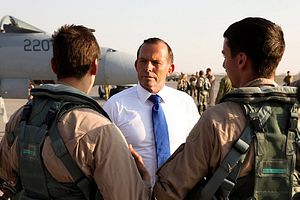On January 5, Australian Prime Minister Tony Abbott paid a surprise visit to Baghdad, making him the first Australian leader to visit Iraq since Julia Gillard in 2009. Australia is part of the U.S.-led coalition conducting airstrikes against the Islamic State (IS), and Abbott has been one of the United States’ strongest allies in this venture since IS began its brutal campaign last summer.
After initial dramatic advances by IS, which originated in Syria and swept into Iraq, the international community was mobilized. Since last August, the U.S.-led coalition (including Bahrain, Jordan, Qatar, Saudi Arabia and the United Arab Emirates) has launched more than 900 air strikes against IS targets. When Obama approved the use of air strikes, Abbott backed the decision to conduct airstrikes in Iraq and defend minorities from attacks by IS, calling the organization a “highly potent insurgent army” that could “pose a significant threat to international security.” Abbott’s visit to Iraq last week was his first to the country since those airstrikes began.
While in Baghdad, Abbott promised to strengthen support for the legitimate Iraqi government. His conversation with Iraqi Prime Minister Haider al-Abadi focused on further military cooperation, including the training and equipping of Iraqi soldiers. Abbott also visited the 200 Australian Special Forces currently stationed in Baghdad to personally thank them for being “prepared to put your country first in a way that almost no one else is.”
The Special Forces are currently in Baghdad to advise and assist local forces. However, talks between Abbott and Abadi left the door open for future discussions on how the Special Forces could become more involved in military exercises. “Our focus is on making sure our existing commitment is as effective as possible,” Abbott stated. “We’re there to help counter this threat, not just to the people of Iraq but to the people of Australia. We’re there effectively to defend Australia and obviously I want our troops to be as vigorous as possible.” Abbott is open to further talks that could lead to deploying forces beyond Baghdad and closer to the front lines, but he is also cautious about not going too far. Abbott has explicitly stated that Australia is “not going to … participate in independent combat operations.”
Though Australian Special Forces moved rapidly to the United Arab Emirates to take part in the fight against IS, it took two months before the troops actually moved into Iraq last November. The delay stemmed from difficulty establishing a legal framework for the Australian force presence in Iraq. There was some indication that Australia sought a Status of Forces Agreement, which would protect Australian forces from civilian prosecution and formalize Australia’s military presence. In the end, the Australian and Iraqi governments agreed that the Special Forces would enter Iraq with diplomatic passports, which provide the necessary legal rights for Australian troops to be repatriated and dealt with in Australia should the need arise.
Paul Jennings, head of the Australian Strategic Policy Institute, commented on the frustration Australia felt over the slow response from Baghdad: “The Iraqi government does not seem to have a realistic grasp of the threat it is facing from ISIS and it doesn’t seem capable of making quick decisions… It has been frustrating for our folk because they were ready to go months ago.” Whatever reluctance Iraq’s government might have initially had seems to have disappeared, as the prime minister’s office stated that Abadi “called on the Australian side to increase the arming and speed up the training and distribution of what is needed by the Iraq forces to decide the battle of and eliminate the [IS] organization.”
In addition to the 200 Special Forces in Iraq, the Royal Australian Air Force is flying support missions and air strikes. Australian Super Hornets began sorties over Iraq last October, which allowed U.S. and other coalition forces to focus on Syria. At the APEC meeting last November, Obama thanked Abbott for Australia’s commitment to the coalition: “Tony personally has expressed his extraordinary commitment to battling foreign fighters that threaten both of our homelands. And obviously, the men and women of Australian armed forces have terrific capabilities and on many occasions have made extraordinary sacrifice. So first and foremost, I want to thank him for the security partnership that we have.” Abbott also showed Australia’s commitment to fighting the “death cult” of IS by pledging $5 million in humanitarian assistance. This raises Australia’s total contribution since last June to $22 million.
Critics such as Hugh White have chastised Abbott’s involvement in such a risky venture for ill-defined reasons, such as fighting IS because the group is “a menace to the whole world” or “against our common humanity.” To these critics, Australian alignment with the U.S. on this issue is another iteration of the old pattern of strategic dependency – hoping that working with the U.S. will gain Australia a seat at the table when the fighting is over.
However, Australia does have a concrete interest in halting IS. As Brad Halt has argued in The Diplomat, Australia faces a very real threat of battle-hardened radicals returning to Australia after fighting alongside extremists in Iraq and Syria. Australian officials estimate that 60 citizens are currently fighting with IS, though estimates range as high as 250. Should they decide to bring the campaign home, Australia could face a serious security threat. Abbott reiterated this point when he said in Dubai, another stop on his Middle East trip, that Australian troops are fighting in the Middle East to “stop the fight coming to Australia.”

































